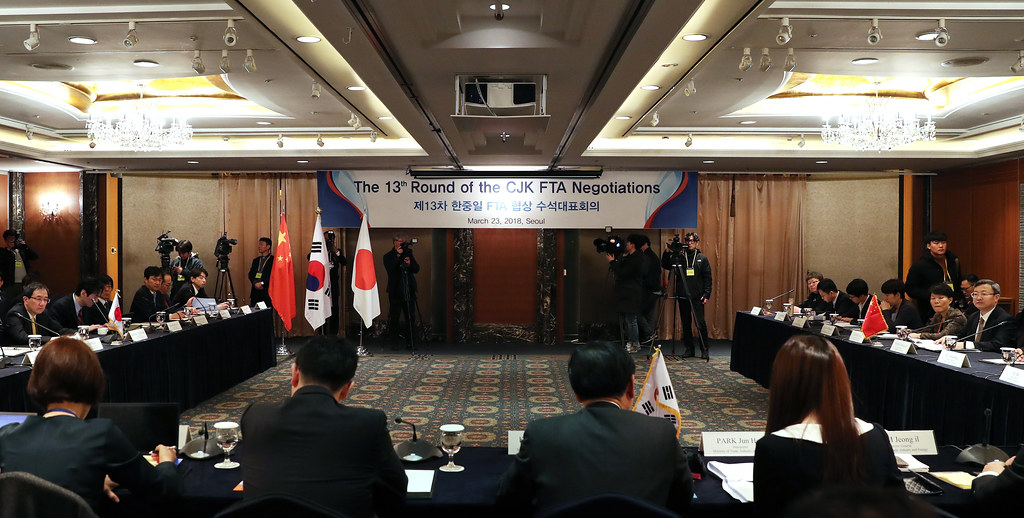China’s push for FTA with S. Korea, Japan appears aimed at checking US influence
Yonhap | 30 November 2020
China’s push for FTA with S. Korea, Japan appears aimed at checking US influence
By Song Sang-ho
SEOUL, Nov. 30 (Yonhap) — China’s renewed pursuit of a free trade agreement (FTA) with South Korea and Japan appears aimed at undercutting U.S. influence and shaping regional economic cooperation on terms favorable to it, analysts said Monday.
During his visit to Seoul and Tokyo last week, Chinese Foreign Minister Wang Yi voiced Beijing’s desire for the trilateral FTA, as China appears leery of U.S. President-elect Joe Biden’s plan to work with America’s democratic allies to set global trading rules and reassert its leadership.
Beijing’s refocus on the FTA came as China seeks to further cement its role in promoting multilateral cooperation after the Nov. 15 signing of the 15-member Regional Comprehensive Economic Partnership agreement (RCEP) that involves China, South Korea and Japan.
The United States is party to neither the RCEP nor another major trading deal, called the Comprehensive Progressive Trans-Pacific Partnership (CPTPP) — an apparent sign that America’s presence in the world’s multilateral trading system has weakened amid President Donald Trump’s inward-looking streak marked by his "America First" mantra.
"When President-elect Biden talks of even hosting a global summit for democracy, China might want to forge many platforms in which it can step in and maximize its regional engagement," Nam Chang-hee, professor of international politics at Inha University, said.
"Now that the RCEP has finally been clinched, the best platform for China to exclude the U.S. would be the trilateral trade deal with South Korea and Japan, which China may think will be a weak node it can take aim at," he added.
During his talks with Foreign Minister Kang Kyung-wha on Thursday, Wang stressed that South Korea and China are working together to "contribute to promoting regional economic integration and complementing the global governance system."
During a dinner with former ruling Democratic Party chief Lee Hae-chan on the same day, Wang expressed hope that by spurring efforts for a South Korea-China-Japan FTA, the three countries can engage in higher-level economic cooperation than the RCEP.
On Friday, Moon Chung-in, special foreign policy adviser to President Moon Jae-in, also called for a regional economic community in Northeast Asia as a way to break away from the "U.S. or China" framework. The adviser made the case after having a breakfast meeting with Wang earlier in the day.
On-again and off-again talks for the trilateral FTA opened officially in 2013. Progress has been limited due to differences on the extent of trade liberalization, with their bilateral diplomatic spats further compounding the negotiations.
Wang’s call for the FTA came after Chinese President Xi Jinping told a virtual Asia Pacific Economic Cooperation summit earlier this month that Beijing will favorably consider joining the CPTPP — remarks reinforcing China’s image as a champion of free trade and multilateralism in the absence of America’s presence in the agreement.
China did not participate in the negotiations of the TPP — the precursor of the CPTPP — due in part to the high level of market opening and other requirements. In 2017, the Trump administration pulled out of the TPP negotiated under Barack Obama.
Jee Maansoo, senior researcher at the Korea Institute of Finance, noted that China appears to be accelerating its efforts to strengthen footholds in the global multilateral trading system before the Biden administration is sworn in to begin earnest moves to reengage with the world.
"The fact that Biden said he would return to multilateralism and that the U.S. has yet to move (before his inauguration) ... this appears to motivate China to quicken its efforts in making first moves before the U.S. surely comes back," Jee said.
"China apparently wants to show that it has consistently been championing multilateralism and free trade, and wants to show it more robustly, when Biden says the U.S. would return as a rule setter," he added.
Uncertainty hangs over the prospects of the FTA among South Korea, China and Japan, as Seoul and Tokyo have been embroiled in a protracted row over wartime history and trade, with Beijing and Tokyo mired in a long-running dispute over a chain of islands in the East China Sea.
Tensions between Seoul and Beijing have also flared up at times, as Beijing remains uneasy about the presence of a U.S. anti-missile system on South Korean soil, which it argues undermines its security interests.
Both South Korea and Japan might also have to consider their decadeslong alliance partnerships with the U.S. as they consider forging a trade deal with China, which could develop geopolitical overtones, analysts said.
"Washington could feel wary of South Korea, China and Japan getting too close to one another," Nam said. "South Korea should strengthen the trilateral relationship with the U.S. and Japan, and try to create a virtuous cycle between the relationship and the South Korea-China-Japan partnership."






